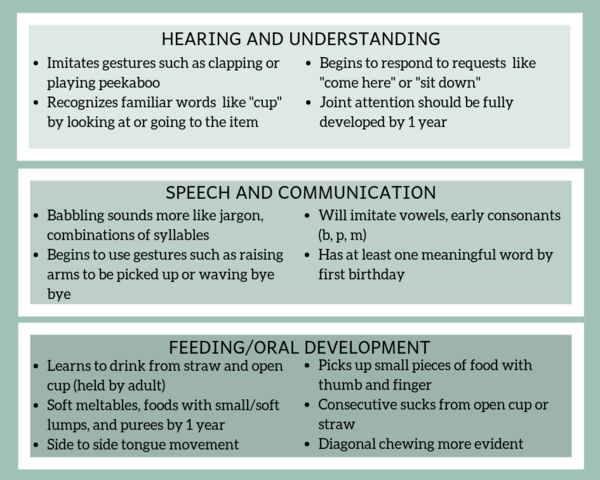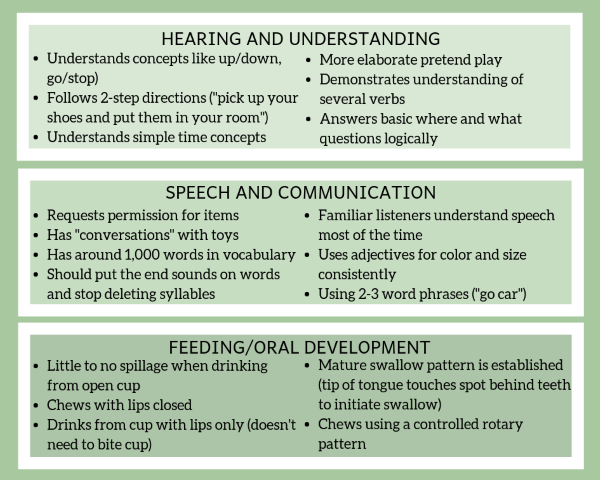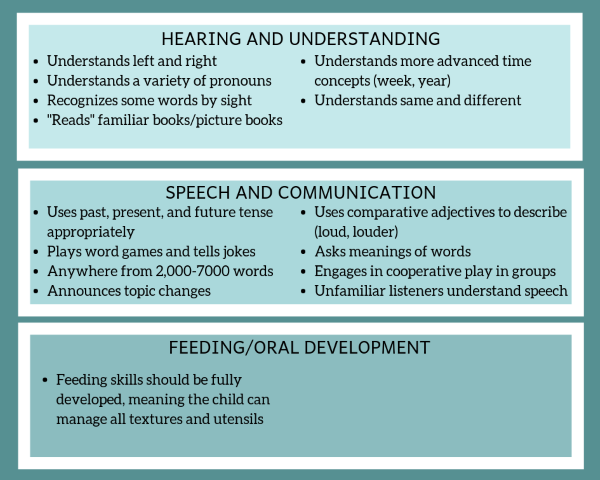What Should my Child be Doing?
We get conflicting reports on what our children should be doing at a given age--especially when it comes to language, communication, and feeding. Your Mom says you were talking in full sentences at one (you're her little genius). The pediatrician says "give it 6 more months" or “put her plate in the fridge when she won’t eat—she’ll get hungry eventually.” Then there's Google. And WebMD (who thinks we all have an obscure fungal disease from the Nile river).
This post may just insert another voice in your head and bring more confusion (sorry). Hopefully it either gives you peace of mind or prompts you to talk with someone about your concerns. Listed below, you'll find important speech, language, and feeding skills and at what age you should see those skills develop. I’ll also list a few milestones when a child should eliminate a behavior or things to avoid in the first place. First, let's go over some basics you'll need to get the most out of that information.
Let's Cover the Basics
Speech and language are actually two different things:
Speech
"Speech" refers to the physical means of communication. It includes 4 different areas: articulation, voice, resonance, and fluency.
Articulation is when our articulators (tongue, lips, jaw) produce the sounds we understand to make up words and sentences. When you can't understand your child's speech, the issue is probably with her articulation.
Voice involves using our vocal cords to breath and produce sound. Without our vocal cords, we wouldn't be able to make different speech sounds. Some issues here may be a hoarse or harsh vocal quality or a breathy, quiet vocal quality.
Resonance is how the sounds made by the vocal cords is affected by the structures between the throat and the lips. Think about how an echo would sound differently in different sized rooms. Resonance in speech is affected by the soft palate (where the nasal passage and the throat connect) and other structures to make the voice sound more nasal or less nasal.
Fluency involves the "smoothness" or rhythm of speech. Stuttering is when a person does not have fluent speech.
Language
I like ASHA's (American Speech and Hearing Association) definition of language:
"Language is made up of socially acceptable rules that include the following:
What words mean (e.g., "star" can refer to a bright object in the night sky or a celebrity)
How to make new words (e.g., friend, friendly, unfriendly)
How to put words together (e.g., "Peg walked to the new store" rather than "Peg walk store new")
What word combinations are best in what situations ("Would you mind moving your foot?" could quickly change to "Get off my foot, please!" if the first request did not produce results)"
Breaking that down even further, you have Expressive Language (how we communicate with others) and Receptive Language (how we understand what we hear). The skills listed below will be split into these 2 categories.
Feeding
Feeding skills refer to anything needed to eat and swallow food and liquids efficiently and effectively. These skills can include anything from chewing to keeping liquid from spilling out of the mouth.
Skills By Age
*These skills will develop during the ages listed and are expected to be mastered by the end of that age range.
Birth - 6 months:
Congrats on your sweet little one! I know Baby is beautiful and precious and all the good things.
For it was you who created my inward parts; you knit me together in my mother's womb." Psalm 139:13
It's so insanely amazing that God knew your child before she was created. God put everything in your baby's little body together to be the exact person she is. He knows this may be hard to process if your little one was born with medical issues, but He's with you through it! (Joshua 1:9)
The most important thing for your baby at this age is to become aware of her surroundings and begin recognizing her primary caregivers (Mom, Dad, grandparents). Be on the lookout for signs your baby has difficulty hearing, even if your baby passed the newborn hearing screening. They could have hearing loss (usually temporary) caused by ear infections, which would greatly impact development as she grows.
Go ahead and introduce purees and meltable solids (like the baby puffs) around 5-6 months. Believe it or not, your baby can start learning to drink from an open cup (held by you) and from a straw. Your child won’t be a pro at any of these skills by 6 months, but they should be making progress.
A note about pacifiers: Pacifiers are great for babies under 6 months and have even been shown to reduce chances of SIDS. However, around 6 months is the best time to start weaning your baby off the pacifier. Your baby should be starting to eat purees and soft solids around this age and continued use of a pacifier could hinder movement towards the more mature swallow pattern needed for solid foods. You guys don’t have to give it up cold turkey! The goal is to be off the pacifier completely by her first birthday. Start by reducing the amount of time baby has the pacifier during the day and wean off night time use by age one. (If your baby is having a hard time with letting go of the paci, try to replace the suckling of a pacifier with another soothing activity like chewing. My favorite are the Chewy Tubes. Red Chewy Tubes are a little bigger than yellow, so decide which would work best for your baby.)
6 Months - 1 Year:
You've probably been thinking "where did the time go" quite a bit lately. Your little one is almost a whole year old! This birthday is a big marker for development because many of the skills developed here are very important for the development of later skills. So, there are several things for which to be on the lookout.
In regards to understanding and hearing, your child should start recognizing familiar items by name. This may mean they look at their cup when you say "cup" or they smile at the dog when you say "dog." It's also important that they have learned to follow some simple directions like "come here." Keep in mind, this means they are able to follow these directions, not that they are always willing to do so!
Your child should be communicating using gestures by the age of one. They may bring you their cup when it's empty or wave hello/bye-bye to adults (even if they need prompting). They are learning that actions (and eventually words) have the ability to give them power over their environment. That's what communication is, after all. You should start hearing more and more sounds that are "speech like." By their first birthday, children usually have a few words which are often related to their favorite things--cup, dog, juice, eat.
A very important skill that should continue developing during this stage is the ability to imitate actions and sounds (may or may not be speech sounds). Imitation is critical for development of language. This is probably the most common skill I see missing in my clients younger than 3, especially if they come to see me due to difficulties communicating. If you're not seeing this imitation skill now, definitely start working on it. When they make silly faces, you make the same silly face. When they clap, you clap. Most importantly, when they make sounds, you say those same sounds.
If your child's first birthday passes without hearing their first words, there are a few things you can do. Keep an eye out for a follow up post detailing practical steps to help develop your child's language.
Children should be consistently eating purees and soft solids by age one. It’s still okay for them to be getting primary nutrition from breast or bottle feeding, but food should be replacing a growing number of those calories.
A note about sippy cups: Contrary to popular belief, sippy cups are not a “developmental stage.” They can actually cause poor oral motor patterns that could lead to speech and feeding issues down the road. Skip the sippy cup and go for a straw cup instead. Check out Melanie Potock’s blog post for more reasons to skip the sippy and how to replace it.
1 - 2 Years
This is an important year for development. Your child should be learning to follow slightly more difficult directions. They should go get their teddy bear if you say "where's your bear" or bring you the cup they're holding if you say "bring me your cup." Again, this has nothing to do with that sweet stubbornness that makes them selectively follow directions. I'm talking about having the ability to follow very basic, 1-step directions like the examples listed above.
A child should have between 50 and 100 words by the time they turn two-years-old. Your child may be a bit delayed if she has close to 50 words (maybe 30-40). Give it another month or two to see if she starts using more words. If your child turns 2 and only has a handful of words, you'll want to talk to your pediatrician or contact a speech therapist in your area. Your child may be eligible for Early Intervention. If you're not familiar with this program or would like more information, check out this blog post where I give you an overview. Keep your eyes open for another blog post to give you some ideas of how to help at home.
Like I mentioned in the last section, imitation is an important skill. If you're not seeing any signs of imitation while your child is one-year-old, hit this skill hard. See above section for a few ideas on introducing imitation.
By 2-years-old, a child should be receiving all of nutrition from food. They should be able to handle any foods an adult can eat (with modifications like smaller bites, of course). Continuing to nurse past the age of two is totally fine, but consider talking to an SLP or OT trained in feeding and oral motor function if she gets most of her nutrition from nursing. If your child consistently demonstrates mealtime behaviors such as refusing to try new foods or eating slowly or limits her diet to easy to chew foods, you may want to meet with an SLP or OT trained in oral motor function and feeding.
2 - 3 Years:
You have a roaming, destructive toddler on your hands. Even if your kiddo has medical issues or a developmental disorder, you're probably noticing a little more attitude (whether or not they are verbal). I know I said this last time, but the age of 2 is a huge year for language development. For those kids who seem typically developing, this is usually when parents start noticing issues with communication. Kids with special needs like Down Syndrome or Cerebral Palsy are probably already receiving services by this point. This is also the time when parents may see signs of autism and become concerned.
Talk to your pediatrician or contact a speech therapist in your area for more information or to schedule an evaluation. Look for a blog post in the near future to give you ideas on what to talk about with the doctor.
By the time your child is 3, they should be talking your head off. Her vocabulary size should be around 1,000 words by her third birthday. She should have a word for just about everything and be able to get all her wants and needs met by using 2-3 word phrases. Familiar listeners like Mom, Dad, grandparents, or siblings should understand her speech most of the time. Unfamiliar listeners should understand topics that are in context, but probably have trouble understanding out of context topics. You should notice the use of nouns, verbs, and basic adjectives.
She should understand words like "big" and "little." She may ask for a "big" piece of cake or the "little" bug. Following directions that involve more than one step should be easier. She should be able to pick up her shoes and put them in her room when asked (even though she may need a few repetitions to actually do it).
During the toddler years, kids go through phases of picky eating that are totally normal. They may stop eating foods they previously ate or get stuck on a few foods they want over.. and over.. and over. If your child isn’t typically a picky eater and you see these behaviors start, don’t panic. Make sure to keep exposing her to the foods she refuses without forcing her to eat them. She should add them back to her diet over the next few weeks or months. If these behaviors are pretty typical for your child or they accompany other “picky eating” behaviors, consult with an SLP or OT trained in oral motor function and feeding.
3 - 4 Years:
Your child should be doing lots of fun things by the time she turns 4. Kids should be telling you about things that happened when you weren't there (or if you were there and they want to talk about it again). She may say "I saw a dog at Nana's house" or "Papaw built a tower" after staying with the grandparents. These little "stories" may not always make sense, but your child now has enough language to fill you in on parts of her day.
She should be answering and asking yes/no questions like "do you want to watch Little Mermaid" (yes, obviously). Your child may ask "can I have more" after she's eaten all her goldfish crackers. Three-year-olds should talk about things that interest them. They may tell you their favorite Ninja Turtle or character from Bubble Guppies and can carry on a basic conversation about that character. Your child may say she's "mad" when she doesn't get more cookies.
She may need to be evaluated by a speech therapist if you aren't noticing many of the skills listed in the chart below. There may also be preschool services available through your local school system. Click here to find out more about that.
Aside from some of those typical picky eating behaviors I mentioned in the last age group, your child should be able to handle any textures and should be (mostly) willing to try new foods. It’s okay if they don’t like certain things—we all have preferences. I’ve touched on several picky eating behaviors in the previous age groups, so keep an eye out for those and meet with an SLP or OT with oral motor function and feeding training if you’re concerned (this goes for the next two age groups, too).
4 - 5 Years:
Children on their way to five should be able to participate in a back and forth conversation by now and can give direct requests with a reason. For example, they can hold their own with siblings by saying things like "give that back, it's mine." They can tell stories and may even make up stories if they're the creative type.
Five-year-olds should have no trouble answering age appropriate questions and should be learning information through listening. That's why you may notice preschool programs become more structured and intentional once a child is 4 or 5. They may talk about how they "hope" they get a bike for Christmas or they "wish" they could go to a friend's birthday party.
Your child may continue to have difficulty producing certain speech sounds like R, L, or S. However, both you and people who don’t know your child should be able to understand her speech at least 90% of the time.
5-6 Years:
Necessary language skills should have been established for awhile, meaning your child can have back and forth conversations with adults and peers. Most speech sounds should be fully developed by age 6. Some children may continue to struggle with production of R, but they should at least be able to produce the R correctly when prompted. If not, it may be time to see an SLP. If you’re unable to understand your child or unfamiliar listeners are always looking to you for interpretation, consider an evaluation by a speech therapist.
Thoughts? Questions? Feel free to comment below.







